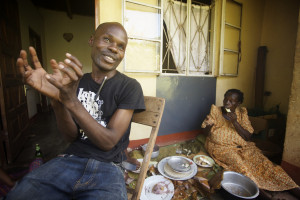How to Gain the Trust of Your Documentary Subjects
 David Kato, left, in "Call me Kuchu."
David Kato, left, in "Call me Kuchu."
By Tom Isler
The folks at the International Documentary Association have posted a short interview clip with Malika Zouhali-Worrall, co-director of Call Me Kuchu, talking about gaining trust of your documentary subjects. It’s an important topic for any documentary filmmaker, but particularly those seeking to make advocacy videos, and Ms. Zouhali-Worrall has some points that can be generalized for a lot of different situations.
Call Me Kuchu follows efforts of activists in Uganda who oppose an “Anti-Homosexuality Bill,” which criminalizes homosexuality and proposes death for HIV-positive gay men. Being outed in Uganda carries drastic consequences, and it’s not surprising to hear that some of the filmmakers’ subjects were wary of Ms. Zouhali-Worrall and her filmmaking partner Katherine Fairfax Wright.
Her thoughts on the topic:
A few lessons can be drawn from Ms. Zouhali-Worrall’s experience:
— Develop a relationship with someone respected in the world you seek to document. They can vouch for you, and introduce you to other key players who might to appear in your documentary or facilitate production. But make sure that your main contact is actually advocating on your behalf. Sometimes, if your main contact trusts you implicitly, he or she might forget to champion you to others and persuade them to take part in your project, or accept your presence at events.
— Be visible and available. Arrive early, make introductions before you’re begin filming, and get personal buy-ins from those who will be on camera. It takes time, and might eliminate some spontaneity, but in the end, making contact with all of your subjects will earn you credibility and strengthen your relationships.
— Hang around. A lot of journalists are on tight deadlines and will shoot and scoot. If you keep showing up, and keep hanging around, subjects will realize that you’re interested in understanding the full story, not just getting sound bites for a hasty product.
— Stay in touch. Once you meet people, keep communication lines open. Let people know what you’re doing, and give them progress updates.
Other tips I’ve picked up along the way:
— Try not to film at the first meeting. Obviously, this will depend on the situation, but if you can meet subjects before the cameras are rolling, that might help put them at ease, and help prove that you’re interested in them, and that you’re not just there to get take something from them for your own purposes. That doesn’t mean that you will “rehearse” or even discuss topics that you will be addressed on film. But making introductions can help.
— Ease into it. A corollary is don’t film anything important the first time you shoot with a subject, if you can help it. Subjects often need time to get comfortable with the camera. If you can arrange to film something that isn’t going to be vital to the final cut, there’s less pressure in such a situation to get great footage. A low-stress shoot can help set the relationship off on the right path. If you’re only shooting an interview, and can’t meet ahead of time, ease into the interview with non-essential questions, just to let the subject warm up a bit. You can even go back later in the interview and re-ask your first few questions, when they feel more comfortable or trust you more.
— Show your work. In some situations, it can be helpful to show subjects other things you’ve produced, work that shows your compassion or fair treatment of your subjects – to gain their trust. But be careful. You don’t want to seed doubt in their heads about one day being that person on the screen.
— Be honest, and be a good listener. Be up front about what you’re doing and why you’re doing it. Honesty and clarity will build trust. Also, people like to feel that they have been heard, so if you listen well, you can start off on the right foot.
Gaining trust is just part of building a relationship with a subject. If you can build strong relationships with subjects, you can minimize (to some extent, hopefully) the possibility of souring relations that turn into legal problems. ![]()


